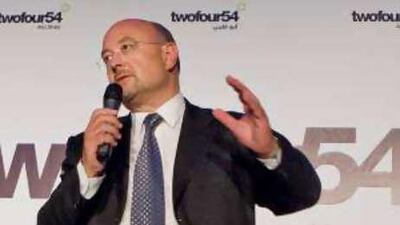ABU DHABI // Some of the world's most prominent media brands stood with Abu Dhabi officials yesterday to announce the creation of a new media zone, designed to nurture an industry run by and for Arabs. The zone, which combines training, production and business incubation facilities, will be named twofour54, after the geographic co-ordinates of the capital city that will host it.
Its primary goal will be to train and employ Arab media professionals in film, broadcast, digital and publishing, while bolstering Abu Dhabi's role as a regional cultural centre, according to Tony Orsten, the chief executive of the zone. "The vast majority of people in the Arab world are young, they have aspirations, they have good connectivity with the rest of the world through internet and through mobile phones, but they don't have the same media creation opportunities as people in London, in New York and in Los Angeles do," said Mr Orsten, a London native who has spent three decades working in television and radio. "We are going to try to begin to do something about it."
So far, the Government-sponsored initiative has formed partnerships with CNN, the BBC, the Financial Times, Thomson Reuters Foundation, Thomson Foundation, Random House, Harper Collins, Rotana Studios, CSky Pictures, Comedy Arabia, the events promoter Flash, Imagenation film fund and the Abu Dhabi Media Company, the owner and publisher of The National.
The zone's temporary campus, located near Khalifa Park, is scheduled to open in the next month. Its permanent home will be a 200,000-square-metre waterfront site in the Mina Zayed development that is still being negotiated, Mr Orsten said. Michael Joroff and Bernard Tschumi, architects based in the US, have been working on plans. By the end of the first quarter of next year, the zone will employ about 200 people, with 800 more expected to be hired by the partners. The businesses will be registered in a free zone, meaning they will be exempt from some of the UAE's business ownership laws, but Mr Orsten is emphatic that the initiative is not about property. "These partners that come in aren't here for the real estate," he said. The academy, which will be called twofour54 tadreeb, will be run through partnerships, including with the BBC. "This is the first time we've partnered like this on a training venture," said Jerry Timmins, the head of the Africa and Middle East Region for the BBC. "BBC will be focusing on production skills, making sure that people can produce output to the highest standards, technically, and making full use of production skills to explain a story." Working with the BBC will be both the Thomson Foundation and the Thomson Reuters Foundation, which runs journalism training programmes around the world. The courses will be taught in Arabic and focus on everything from helping journalists to brush up on their multimedia skills to giving them the tools to cover climate change, according to Monique Villa, the chief executive of the foundation. "The Gulf region is developing very fast, and we at Thomson Reuters think that there is a need to improve levels of professionalism in the media industry," she said. Journalists who emerge from these courses may not have to look far for jobs, since the zone's international partners were committed to hiring the graduates, Mr Orsten said. "They will have job vacancies when they build their businesses, and they will take people from the training academy who will then plug into their businesses." Several of the international partners, including CNN and the BBC, already have a presence in Dubai Media City, but both Mr Orsten and representatives from the partners are adamant that the Abu Dhabi venture won't hurt Dubai. "We have no intention of doing something that would knowingly harm the business in Dubai," Mr Orsten said. "And we have every intention of working as closely with them as humanly possible." CNN, for instance, will create its fourth global hub in Abu Dhabi, in addition to its offices in Dubai. "With a successful long-standing operation in Dubai, it was a natural next stop to have a base in the capital city," said Tony Maddox, the managing director of CNN International. The media zone will also feature a production facilities arm, dubbed twofour54 intaj, and a business incubator, named twofour54 ibtikar, which will provide support and funding for new businesses. A fourth division, called twofour54 tawasol, will provide everything from immigration to human resources services to businesses located in the zone. Regulation is a particularly important issue for content creators, who in the past have been shy to enter the region for fear of censorship and weak enforcement of intellectual property rights. Content created in the media zone will be subject to the laws of Abu Dhabi as well as federal regulations, which give the National Media Council (NMC) the right to censor media. "We are working very closely with the National Media Council and have our own regulatory board here in the media zone currently, which is going to be very closely tied to the NMC," Mr Orsten said. "We think there's a great opportunity to push the boundaries of what media companies can do, within the cultural bounds of the nation and the Arab world." So far, the partners are optimistic about the prospects of both intellectual property protection and free speech in the zone. "We feel that the Government and rulers are welcoming us," said Claudia Gehre, the managing director of Random House Arabia. "I believe that this is really a very good sign of the enlightened politics that they are practising here. "Otherwise," she added, "we would not be here." khagey@thenational.ae

